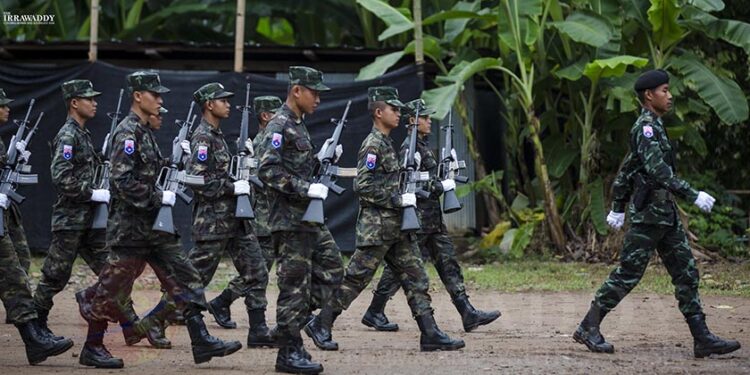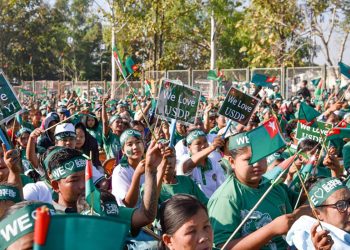CHIANG MAI, Thailand—The Karen revolutionary struggle is not over, as the Nationwide Ceasefire Agreement (NCA) and the political dialogue it calls for have yet to be implemented, Karen National Union chairman General Mutu Say Poe said in an address to his fellow Karen to commemorate the annual Karen Revolution Day.
Friday marked the 71st anniversary of the beginning of the ethnic Karen revolutionary movement in 1949 following the central government’s denunciation of the group as an unlawful organization after months of protests demanding equality for the Karen people.
“Currently, we are still in the mode of revolutionary resistance,” the chairman said in his address on Friday, citing a lack of progress in the peace process.
The Karen resistance movement has long demanded basic rights, equality and self-determination. The KNU is the most senior of Myanmar’s various ethnic armed groups, having resisted central government control for seven decades.
Padoh Saw Kwe Htoo Win, the vice chairman of the KNU, said the group had waged a 63-year campaign of armed resistance because previous governments had ignored its call to resolve the Karen people’s political demands peacefully, through political dialogue. He said the previous governments and junta had only agreed to discuss a ceasefire, not to hold political dialogue
Just eight years ago, the vice chairman told The Irrawaddy, “the previous government acknowledged our endeavors” and the KNU participated in the ceasefire, followed by political dialogue, with the aim of changing the country’s political system in order to establish a federal union guaranteeing equal rights and self-determination for all ethnic groups.
On the 71st anniversary of the revolution, the KNU’s political demand is “to bring about changes in the Union’s political, economic, human rights and security systems and policies” so that they will be in agreement with the aspirations and interests of the Karen people, as well as of other indigenous groups and people throughout the entire country, the chairman said.
The KNU, together with seven other ethnic revolutionary groups, signed the NCA in October 2015 and has been negotiating for a stronger ceasefire and political dialogue for four years. The group first participated in the peace negotiation process led by then-president U Thein Sein in late 2011, and signed a bilateral ceasefire with the government in 2012.
However, the KNU chairman stressed that, despite four years having passed since the group joined the NCA, “implementation cannot be carried out as initially intended by the ethnic nationalities and the citizens, and additionally, as the political dialogue for stabilization of the ceasefire [has not] been done fully in accordance with the terms of the agreement, delays have arisen.”
“Whatever it may be, efforts must be continued for the implementation to be undertaken, in accordance with the terms of the NCA,” he said.
General Mutu Say Poe also urged the Karen people “to make greater exertions, more preparation and further efforts,” to achieve their political aspirations and the political objectives of the KNU. He urged Karen people to work together, and put aside political differences.
“Different political views and convictions and efforts for power and opportunities have led to factions among the Karen people, in addition to within the KNU,” he said.
The KNU, together with other ethnic armed organizations (EAOs) that have signed the NCA, recently resumed talks on political negotiations and ceasefire monitoring with the National League for Democracy government after a hiatus of more than a year.
Despite the talks, tensions between the KNU’s armed wing, the Karen National Liberation Army (KNLA), and the Myanmar military (or Tatmadaw) continue, especially in areas controlled by the KNLA’s brigades 2, 3 and 5, over the military’s rebuilding of a road linking Karen State’s Papun district with Bago Region’s Kyauk Kyi.
This week, the military accused the KNU of conducting a targeted mine attack to kill a Tatmadaw battalion commander who was leading a security patrol in the area of the road project. The KNU denied the allegation.
Padoh Saw Kwe Htoo Win also said the KNU would continue its efforts at political dialogue.
“Based on experience, we have concerns and doubts, and the challenges remain because the agreements are not implemented according to the agreed principles. Therefore, the chairman urges all Karen nationals, whether they are members of armed groups, politicians, civil society groups or the general public, to work harder and to work hand in hand,” he said.
You may also like these stories:
KNU Leaders Call for Continued Struggle on 70th Anniversary
KNU Urges All Karen to Participate in Political Process in New Year Message
KNU Leaders Close to Naypyidaw Re-Elected

















